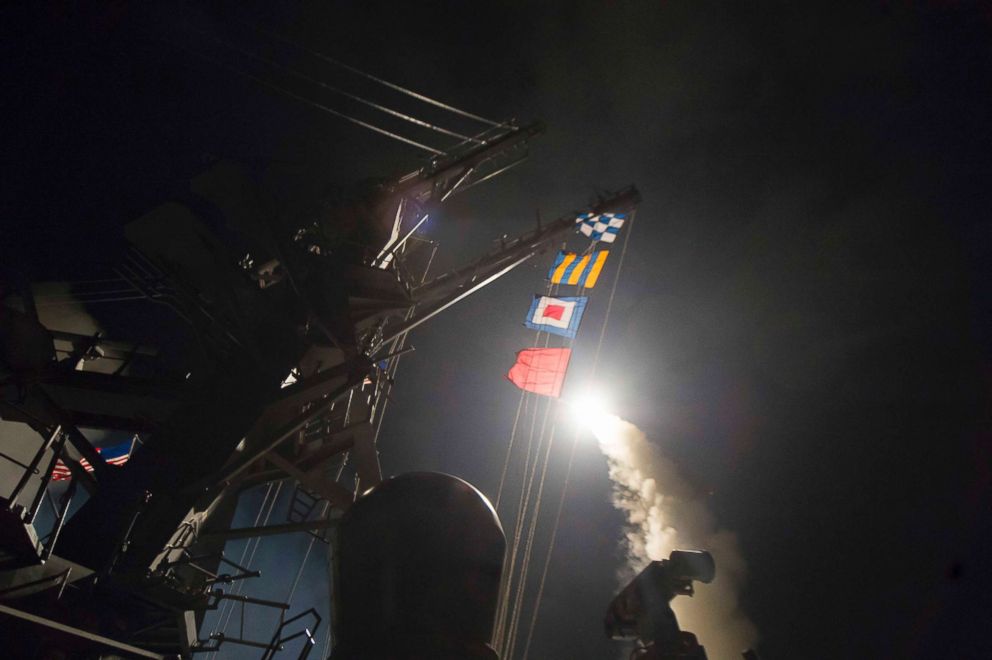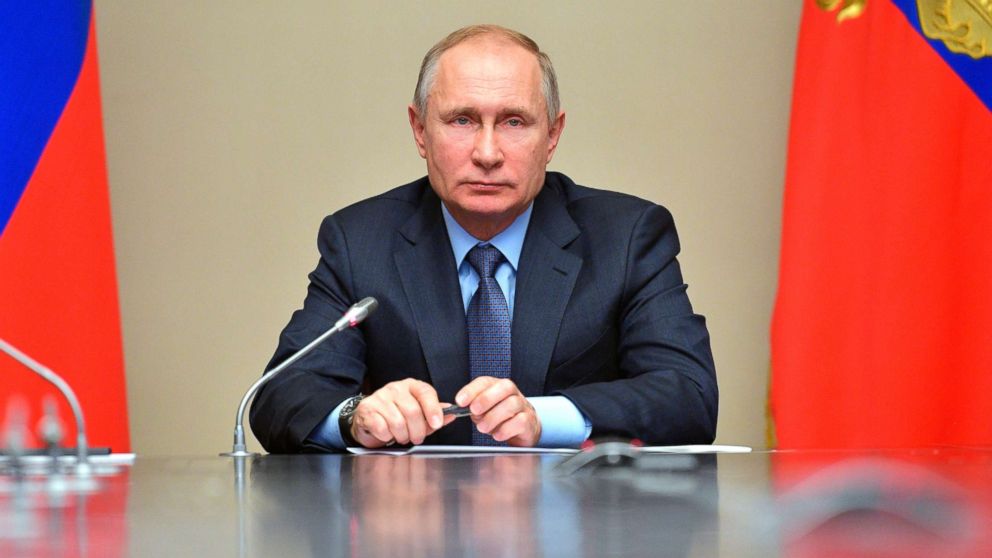How Russia has hinted it could react to US strikes in Syria: ANALYSIS
President Donald Trump on Wednesday in a Tweet told Russia to "get ready" for U.S. missile strikes in Syria, seeming to confirm that the United States will launch punitive strikes against the government of Syrian president Bashar al-Assad over the suspected chemical attack his forces are accused of carrying out.
Trump’s Tweet appeared to have been prompted by comments from Russia’s ambassador to Lebanon, which were widely reported Wednesday morning, that warned Russia would fire not only on any U.S. missiles targeting Syria, but also the units launching them. Trump in his Tweet responded to what he said was Russia’s “vow” to shoot down “any and all” U.S. missiles targeting Syria.
Those comments set off some alarmed reactions that the looming strikes could spark a military clash between Russia and the U.S.
In reality though, how Russia will respond to the strikes on its ally in Syria is a subject of uneasy speculation in Moscow. Few believe the Kremlin is willing to engage in a military clash with the U.S., but years of aggressive bluster between the two countries and complex dynamics of Syria's civil war seems to have created the discomforting sense that, now, it's impossible to entirely rule it out.
"I believe that, of course, we’re not now in the position that we were at the peak of the Cuban Missile Crisis. We are still far from that," said Andrey Kortunov, director of the Russian International Affairs Council, which has ties to the government. “But within that, I believe that now the situation is more dangerous than it has been since any moment the Trump administration came to power.”

Russia has previously threatened to shoot down U.S. missiles and aircraft that threaten the lives of Russian personnel in Syria, but since the crisis began it has been largely silent on how it will respond.
In mid-March, weeks before this current crisis began, the chief of Russia's General Staff, Valery Gerasimov, warned publicly that any U.S. strikes that threatened the lives of Russian servicemen in Syria would prompt Russia to fire on not only the missiles, but also their launchers —- implying Russia would potentially open fire on a U.S. warship that had launched cruise missiles.
That statement attracted notice at the time, seeming to impose a dangerous “red line” for Moscow itself. However, neither Russia’s military nor the Kremlin have repeated the warning since missile strikes have become a real possibility. That was, until Wednesday when the Russian ambassador to Lebanon referred to the warning again in an interview to Hezbollah TV.
"If there is a strike by the Americans, then ... the missiles will be downed and even the sources from which the missiles were fired," Alexander Zasypkin told Hezbollah's al-Manar TV Tuesday evening in Arabic, according to Reuters -- the comment that some believe prompted Trump’s tweet.
But the Kremlin itself has avoided repeating the shoot-down warning, when asked repeatedly about it Wednesday. Nor has Russia's Defense ministry, which has not said what its response to U.S. strikes would be. So far, the Kremlin has seemed to avoid sabre-rattling. The Kremlin's spokesman Dmitry Peskov called for "all countries" to stay away from "destabilizing steps" around Syria, on Wednesday.
Following Trump’s Tweet, Russia’s defense ministry released a statement saying only that the U.S. should rebuild the city of Raqqa, that it helped re-take from the Islamic State, before launching new strikes. The ministry made no reference to its earlier warning that it would target U.S. missiles threatening its forces.
However, the danger of a clash still exists, as Russia’s foreign ministry has warned repeatedly that strikes can lead to “the most grave consequences.” The danger of hitting Russian forces in Syria is also real -- Russian military advisors are embedded in many areas with Syrian forces and located at government facilities.
But U.S. military planners appear to be working on the assumption that Russia will respond as it did the last time Trump ordered a strike against Syria. When Trump launched 56 cruise missiles at a Syrian airbase a year ago, following another chemical attack attributed to the Syrian government, Russia effectively stood aside. Russian leaders heavily criticized the strike, but they made no attempt to bring down the missiles and no military retaliation followed. The U.S. informed Russia of the strike ahead of time, allowing it to remove its forces.
The difference this time is that a larger strike would be expected, as a signal from the U.S. that chemical weapons won’t be tolerated.
Last year’s cruise missile strike destroyed some aircraft and hangers, but the airbase was functioning again within 24 hours, according to the monitoring group the Syrian Observatory for Human Rights.
Therefore, U.S. officials have said they want a more sustained strike that would hit more facilities and cut off the military for more than one day. The U.S. is also likely to be joined by other countries, particularly France and perhaps the U.K.
Few commentators in Moscow believe that Russia is willing to fire on U.S. ships or aircraft and to engage in the major conflict that could spark.
But they also note that, just as the Trump administration is now having to increase the scale of its strike, the Kremlin too may have to ratchet up its reaction to any new strikes. Against a background of the diplomatic crisis caused by the poisoning of a former spy in Britain and fresh U.S. sanctions imposed this week, the level of hostile rhetoric will also make a larger strike harder for Russia to ignore.
Several Russian observers said they believed Russia may try to shoot down some U.S. missiles as a token symbol of resistance.
The earlier Russian warning to also target the attacking ships and aircraft if Russian soldiers were harmed may have put Russia in a more dangerous position, according to Vladimir Frolov, a foreign policy analyst in Moscow.
"Like the American and the French, we have drawn red lines for ourselves, the violation of which, without the promised Russian response, will mean a loss of face," Frolov wrote in an article for the magazine, Republic. "Usually Vladimir Putin tries not to set such mantraps for himself."
The Russian response will likely depend on the scale of the American strikes, Kortunov agreed.
A U.S. official told ABC News that the strike options being considered run the gamut from light to medium to heavy impact, including striking command and control areas for the Syrian military. Another option would be to hit areas housing chemical weapons stocks.
In the previous strike, U.S. missiles were in any case launched on trajectories that had put them out of reach of Russian air defenses and in such a way as to avoid accidentally causing them to think Russian forces were being targeted.
While a military clash or a major escalation following between Russia and the U.S. seemed highly unlikely, a number of commentators felt the risk was now higher than anytime in decades.
"The US and Russia are now closer to a direct collision between their military forces than at any time since the Cold War," Dmitry Trenin, an influential political commentator at the Carnegie Moscow Center, wrote on Twitter this week. “The only question on my mind: will Russia hit back at the US when it launches strikes against Damascus?"




